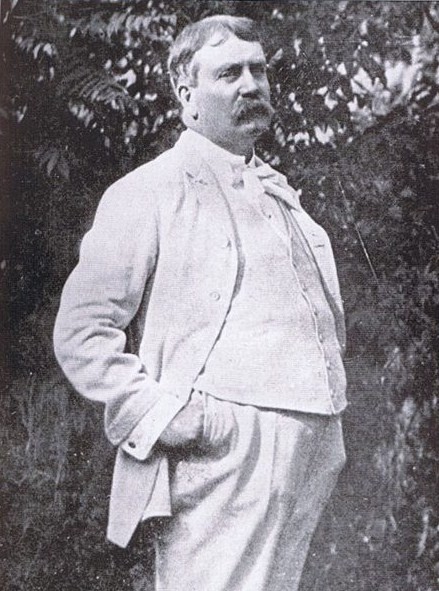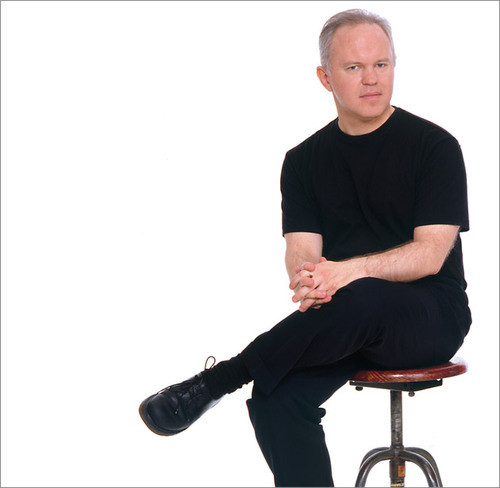Making no small musical plans: Grant Park to premiere new work inspired by Daniel Burnham

The Grant Park Music Festival is rich in anniversaries this year, marking the festival’s 75th season as well as a decade of Carlos Kalmar’s reign as principal conductor.
This weekend, another significant landmark will be observed, with the world premiere of Michael Torke’s Plans. Commissioned by the Grant Park Festival to commemorate the centennial of Daniel Burnham’s visionary Plan of Chicago, Torke’s new work will be performed Friday and Saturday night at the Pritzker Pavilion.
“I was struck by discovering what a huge, towering figure he was in his time,” said Torke, 47, from his home in New York, just before flying to Chicago for this week’s rehearsals. “With the rise of modernism, in certain quarters he was almost forgotten. And now lately, especially with this anniversary, I think there’s been a correction, and he is now seen for the contributions he made to the history of architecture.”
Burnham designed structures as diverse as New York’s Flatiron Building and Union Station in Washington, D.C. His firm, Burnham and Root, was responsible for several Chicago landmarks, such as the Monadnock Building, the Rookery, and the Reliance Building (now, aptly, the Hotel Burnham). As lead architect and driving force behind Chicago’s 1892 Columbian Exposition, Burnham overcame extraordinary practical, economic, and commercial obstacles.
Yet it is his eloquent words, notably “Make no small plans,” in his famous 1909 blueprint for Chicago’s future growth that remains Burnham’s most lasting, non-brick-and-mortar legacy.
“At first I thought the quote was kind of Victorian and flowery and out of date,” says Torke, “Yet as I worked on the score and showed it to people, I found that people get really excited about his words.”

Torke himself has taken Burnham’s advice to heart, creating a large, forty-minute choral symphony in five movements mining Burnham’s famous lines. The full quotation is fairly concise and Torke has dexterously drawn from Burnham’s sentences in the varied sections. “I think his words are inspiring and evocative and they gave me enough material for each of the movements.”
The first, “Make Big Plans,” is set on the vast scale for soloists and chorus. “I’m using a big paintbrush,” says the composer. “The chorus comes in immediately, the phrases are big and the music is exultant.” In the ensuing, “Noble Diagrams,” Torke sets up an eighth-note grid, in which the chorus sings long tones with a “lifting, almost religious quality.”
The third movement, “Long After We Are Gone,” again spotlights the two soloists, with a lilting somewhat “retro” quality, says Torke, while the fourth, “Our Sons and Grandsons” is driving and dynamic with chorus shouts and plenty of orchestral fire. “Carlos says this is the most ‘Torke movement’ of the whole piece,” says the composer, laughing.
Plans is rounded off with “Your Watchword,” a musical representation of Burnham’s Classical design, with four tightly organized lines of interlocking counterpoint. “It’s almost Bach-like but it still has like the up-to-date harmonies I use. It comes out of an idea of Classical order rather than something that is arbitrary or impulsive.”
Following Burnham’s death at 65 in 1912, his reputation went into eclipse for several decades, and he was regarded in many circles as an archaic fuddy-duddy of the Industial Age, his work bitterly criticized by his Chicago rival, Louis Sullivan. Yet in recent years—and in part, due to Erik Larson’s best-selling Chicago history The Devil in the White City—there has been a Burnham resurgence. In addition to this weekend’s Torke premiere, the centennial of The Plan of Chicago is being marked with several city events and exhibits.
Beyond the specific connection to the architect’s stirring words, Torke sees a musical parallel to the Burnham rehabilitation for composers of his generation. Many, like Torke, preferred to write in a more populist, melodic style, yet they came of age at a time when Darmstadt and the more arid, academic musical movements that ascended after the Second World War still held sway at most music schools and conservatories.
“The advent of modernism wiped out certain ideas of how to put musical pieces together,” says Torke. “Once that started to recede in the past few decades, other ideas that replaced modernism came back into focus.”
“So, I think Burnham’s message is really timeless. We live in a different era now. I think we’re in a time when that kind of message really resonates and people do have renewed hope and optimism.”
Carlos Kalmar leads soprano Jonita Lattimore, tenor Bryan Griffin, and the Grant Park Orchestra and Chorus in Michael Torke’s Plans 6:30 p.m. Friday and 7:30 p.m. Saturday at the Pritzker Pavilion. The program also includes Jon Kimura Parker as soloist in Rachmaninoff’s Piano Concerto No. 3. 312-744-9179; www.grantparkmusicfestival.com
Posted in Articles


